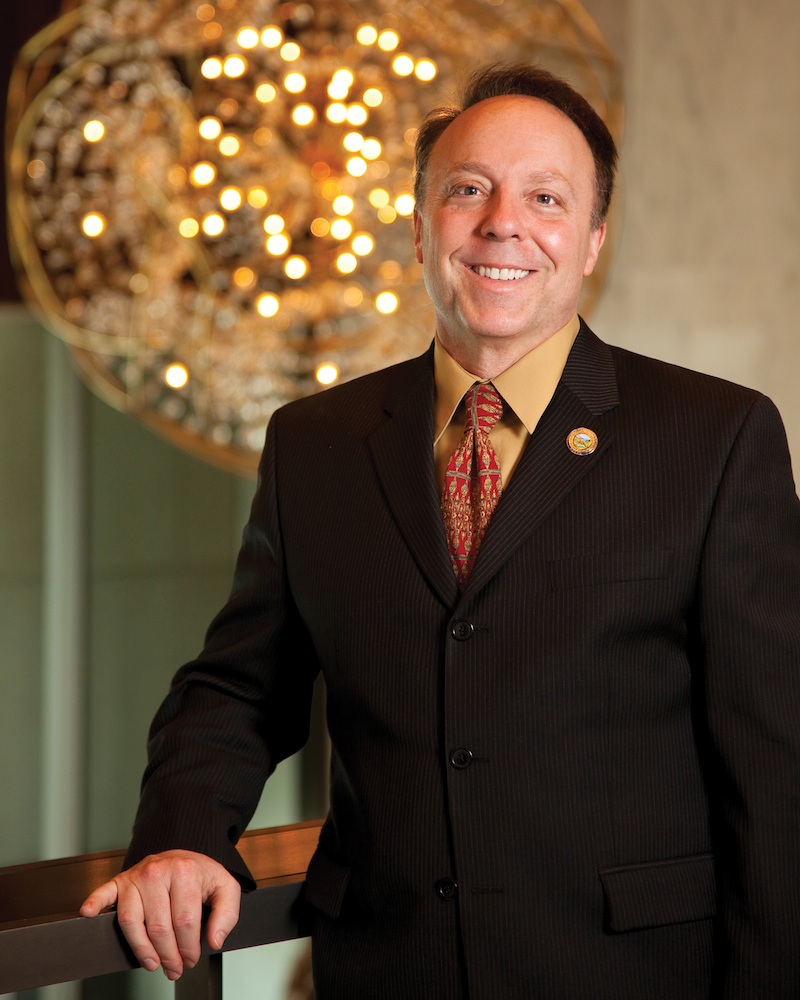Thanksgiving Sharing Material:
CHARLESTON, W.Va. — Although West Virginia Division of Culture and History Commissioner Randall Reid-Smith spends his days traveling the state and encouraging the overlap of the arts and education, his heart belongs to the Village of Barboursville and Cabell Midland High School.

“It was great,” he said. “I grew up right in the village. I went to all three Barboursville schools. My entire family went to Barboursville High School except my nieces who went to Cabell Midland. It was just a great place to grow up.”
After an illustrious singing career which kept him away from home for 39 years, Reid-Smith now spends as much time as possible, personally and professionally, to ensure Cabell Midland, as well as other high schools around the state, are richly rooted in arts education. He also wants schools to receive as many opportunities as possible, regardless of socio-economic status, he said.
“I just believe the arts is such a community involved thing that you want to include your community,” he said. “I had so many people who helped me along the way that you just naturally want to give back. And for me it’s all about kids – it’s all about students and making sure that we create future audiences.”Cabell County Superintendent Bill Smith said Cabell students would not have the same opportunities if it wasn’t for the work of Reid-Smith.
“When you do things for kids and you have someone who really cares about kids, it’s amazing what can be done,” Smith said. “He’s extremely energetic. He’s an excellent role model – kids need to see that giving back. I don’t think you’ll find a better proponent for the arts than him.”
Reid-Smith began in performing arts at the age of four when his mother took him to sing at church every week. As he grew up he expanded his influence, playing saxophone in middle school before returning to voice in high school.
From there, he received a bachelor’s in music from the University of Cincinnati College Conservatory of Music. After a brief stint of private study in New York he received a master’s in music from Indiana University after which his performing career took flight.
“I went from there to spend 14 years in Europe, but I always wanted to come home,” he said. “If you grow up in West Virginia you always want to get out, and if you get out, you always want to come back. It took me 29 years, but I got back.”
After returning back to the United States in 1999, a chance meeting with Gayle and U.S. Sen. Joe Manchin secured his fate with the Division of Culture and History. Sen. Manchin promised to bring Reid-Smith back home to West Virginia as soon as possible.
“I’m in my ninth year,” he said with a smile. “It’s great to be home. The Division of Culture and History is very interesting. They combined four old departments that answer directly to the Governor – the archives, the arts section, historic preservation and the museum, and they have one commissioner.
“I really believe I’m the first commissioner to work all four areas equally.”
Reid-Smith said he received harsh criticism when he took the job, most citing his experience was not adequate to be in charge of departments outside performing arts. This, he said, inspired him to learn everything he could about the other departments, relying on a staff filled with field experts.
“I built up the museum,” he said, adding that the museum is one of his favorite projects to date. “I learned historic preservation because I’m the state historic preservation officer by statute and I listened to the people who are on staff with me because they are the experts. I learn everyday.”
Initially focusing on older adult audiences, Reid-Smith quickly changed direction to focus on arts in schools, a plan, he said, to inspire a future generation of art consumers.
“My first five years, I increased the arts budget by 47 percent and the historic preservation budget by 31 percent because it was important to the governor and it was important to the legislature,” he said. “They never say no. It’s what people want – it’s what people believe in.”
While states around the country have gained national attention for steadily cutting their arts programs, Reid-Smith has ensured the opposite. He credits the art-loving residents of West Virginia for the continued support.
“What makes me the most proud is that I have an opportunity in this state to do what I’ve been able to do and that this state has this opportunity when other states don’t,” he said. “Its important to them. It’s vital to the growth of your community to sustain that growth, to attract people, to attract businesses.
“People looking to start a business, people looking for an area to move to, look for communities like Cabell County which has a symphony, which has a museum, which has a high school that is richly embedded in the arts.”
Reid-Smith said Cabell County’s superintendent is a unique advantage to the county, who, he said, is always willing to try new ways to support arts programs in education.
“He is the best,” Reid-Smith said. “All I have to do is call Bill Smith and it is taken care of. He shows up for everything that I do. When we gave the instruments at Milton he told those kids that this was so important because when he was growing up, he didn’t have the opportunity to play an instrument even though he always wanted to because financially, his parents couldn’t afford it.
“So people who come up that way, they’re the first ones out there to ring the bell to get people to come out and do it. I like him very much.”
From the statewide band invitational, to the expansion of the Golden Horseshow contest and creation of the quiz bowl, to his personal volunteering at Cabell Midland High School, perhaps no other program has so deeply touched Cabell County as the free instrument program. It is sponsored by VH1 and receives attention from national news.
“I’m so glad I hoodooed them into coming here and funding the entire state,” he said with a laugh. “They had never done that before.”
Reid-Smith said VH1 almost didn’t provide any funding, as West Virginia was ahead of the game compared to other states which previously received funding. But Reid-Smith, as his reputation foretells, refused to take no for an answer.
“They had to get back to the airport to leave to go back to where they were going, and they were getting a little bit anxious,” he said, reminiscing. “And I kept saying ‘you should consider doing this. I’ll help you, what do we have to do?’
“They said ‘we can talk about this on the way back to Charleston,’ and I said ‘ as soon as you fund this, I’ll take you back to Charleston. If not, you better start walking.’ Now, every year they come two to three times.”
Although Reid-Smith doesn’t know what his future holds for him, he said he will always be a champion for both the arts and the state of West Virginia.
“My community is the entire state,” he said. “We’re the creative side of Wild and Wonderful. I think we do great work. I don’t even want to say good – I think we do exceptional, great work.
“My mother always taught me it’s not important where you’re sitting in life, it’s important what direction your going in and I always have direction. I always have something to do.”






